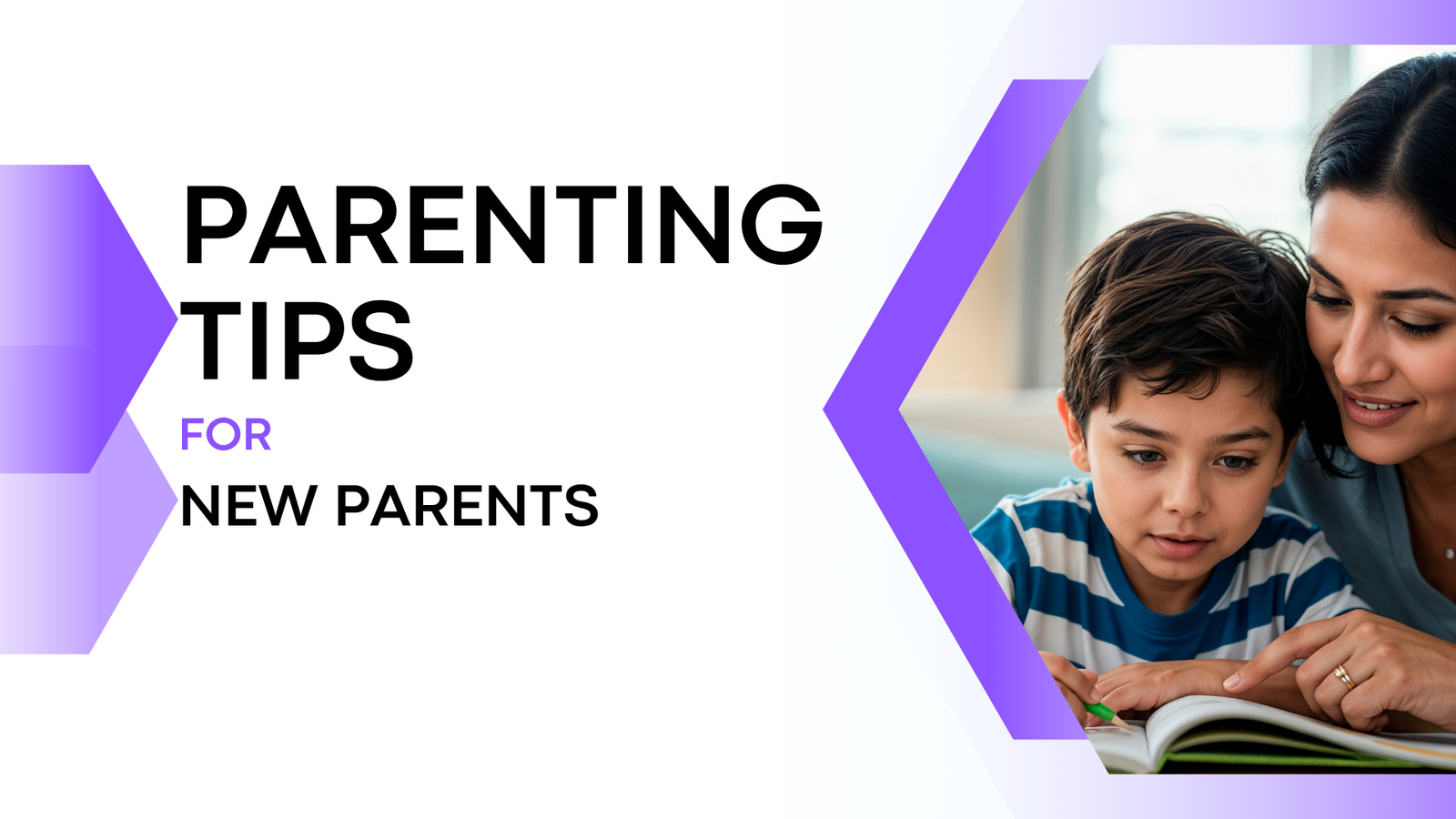Becoming a parent for the first time is an exciting yet overwhelming experience. With so much advice available, it can be challenging to know where to start. This guide provides essential parenting tips for new parents to navigate the journey with confidence and ease.
Simplify parenting with our app.
Click on This Link

Parenting Tips for New Parents
Here are ten essential parenting tips for new parents:
1. Build a Strong Bond with Your Baby
Bonding is crucial for your baby’s emotional and cognitive development. Engage in skin-to-skin contact, talk to your baby, and respond to their needs to foster a secure attachment.
2. Establish a Routine
Newborns thrive on consistency. Creating a daily schedule for feeding, sleeping, and playtime helps them feel secure and promotes better sleep habits.
3. Prioritize Sleep for You and Your Baby
Sleep deprivation is a common challenge for new parents. Encourage good sleep habits by setting a bedtime routine, creating a quiet sleep environment, and ensuring your baby naps adequately during the day.
4. Practice Safe Sleep Guidelines
To reduce the risk of Sudden Infant Death Syndrome (SIDS), always place your baby on their back to sleep, use a firm mattress, and avoid soft bedding and stuffed toys in the crib.
5. Breastfeeding and Nutrition
Breastfeeding provides essential nutrients and strengthens your baby’s immune system. If breastfeeding isn’t an option, consult your pediatrician about formula feeding and maintaining proper nutrition.
6. Keep Up with Pediatric Check-Ups
Regular doctor visits are vital for tracking your baby’s growth and vaccinations. Follow the recommended pediatric check-up schedule to ensure your child’s health and development.
7. Encourage Developmental Milestones
Provide age-appropriate toys, read to your baby, and engage in tummy time to support physical and cognitive development. Celebrate each milestone and encourage progress at your baby’s pace.
8. Manage Stress and Seek Support
Parenting can be stressful, and it’s okay to ask for help. Connect with family, friends, or parenting groups to share experiences and seek advice.
9. Trust Your Instincts
While parenting books and advice are helpful, trust your instincts when it comes to your baby’s needs. Every child is unique, and your intuition will guide you in making the best decisions.
10. Take Care of Yourself
Parenting is a demanding job, but self-care is essential. Prioritize rest, maintain a healthy diet, and take breaks when needed to ensure you’re at your best for your baby.
Bonding with a baby is one of the most beautiful parts of parenthood — it helps build trust, security, and emotional well-being that lasts a lifetime. Both mothers and fathers can bond with their baby through small, loving actions every day.
How Can I Bond With My Baby?
Holding and cuddling your baby skin-to-skin helps them feel safe and connected. Talking, singing, or reading softly allows your baby to recognize your voice and feel comforted. Eye contact during feeding or playtime strengthens emotional connection, while gentle touches and massages promote relaxation and growth.
Fathers can bond by taking part in daily routines — changing diapers, giving baths, or soothing the baby to sleep — all of which create shared moments of affection and trust. Even short periods of focused attention make a big difference.
The key is to be present, calm, and responsive to your baby’s needs. Through warmth, consistency, and love, both parents can nurture a deep, lasting bond that helps their baby thrive emotionally and physically.
How Can I Soothe My Baby?
Soothing babies helps them to feel comfortable. Here are some effective ways parents can soothe their baby:
- Hold your baby close: Physical touch provides warmth, comfort, and a sense of safety.
- Swaddle snugly: Wrapping your baby in a soft blanket can make them feel secure and calm.
- Use a soothing voice: Talking, humming, or singing softly helps your baby recognize your voice and feel reassured.
- Offer a pacifier: Sucking is naturally calming for many babies.
- Pat or rub the back: Gentle rhythmic pats can help comfort and relax your baby.
- Play white noise or lullabies: Soft background sounds can help drown out distractions and calm your baby’s senses.
- Create a calm environment: Dim the lights and reduce noise to help your baby feel relaxed.
- Try skin-to-skin contact: Holding your baby against your chest regulates their heartbeat, breathing, and temperature.
- Stay patient and calm: Babies can sense stress — a relaxed parent helps the baby settle faster.
Each baby is different, so it may take a bit of trial and error to discover what soothes yours best.
How Often Should I Feed My Baby?
Feeding your baby is one of the most important parts of early parenting, and understanding how often to feed them depends on their age, growth stage, and hunger cues. In the first few months of life, newborns have tiny stomachs and need frequent, small meals to stay nourished and hydrated.
For newborns (0–2 months), most babies need to be fed every 2 to 3 hours, which means about 8 to 12 feedings in 24 hours. Breastfed babies may eat more often because breast milk digests faster, while formula-fed babies might go a little longer between feeds. It’s important to feed on demand — whenever your baby shows hunger signs like rooting, sucking on hands, or fussing.
As your baby grows, feeding intervals naturally become longer. By around 3 to 6 months, babies usually feed every 3 to 4 hours. Some may start sleeping longer stretches at night, which is completely normal. Once your baby reaches about 6 months, solid foods can be introduced alongside breast milk or formula, but milk remains their main source of nutrition.
Always remember that every baby is different — some may need to eat more frequently, while others may go longer between feeds. Watch your baby’s cues rather than the clock, and ensure they’re gaining weight steadily and producing enough wet diapers. If you’re ever unsure about your baby’s feeding pattern or nutrition, consult your pediatrician or a lactation expert for personalized guidance.
How can KidsCur Help?
Parenting is a journey filled with love, learning, and challenges. By following these essential parenting tips, new parents can create a nurturing and supportive environment for their child’s growth. Enjoy each moment and trust yourself—you’re doing great!
The KidsCur app helps parents navigate the beautiful yet challenging journey of parenthood by offering trusted, research-backed new parenting tips tailored to every stage of a child’s growth. Through the app, parents can access expert advice, easy-to-understand blogs, and practical guides on topics like baby care, developmental milestones, nutrition, vaccinations, and many more.

